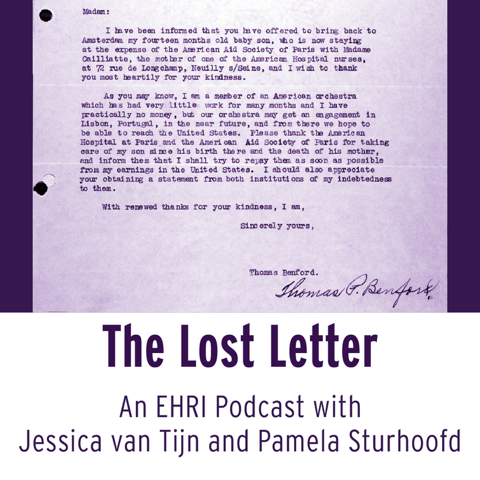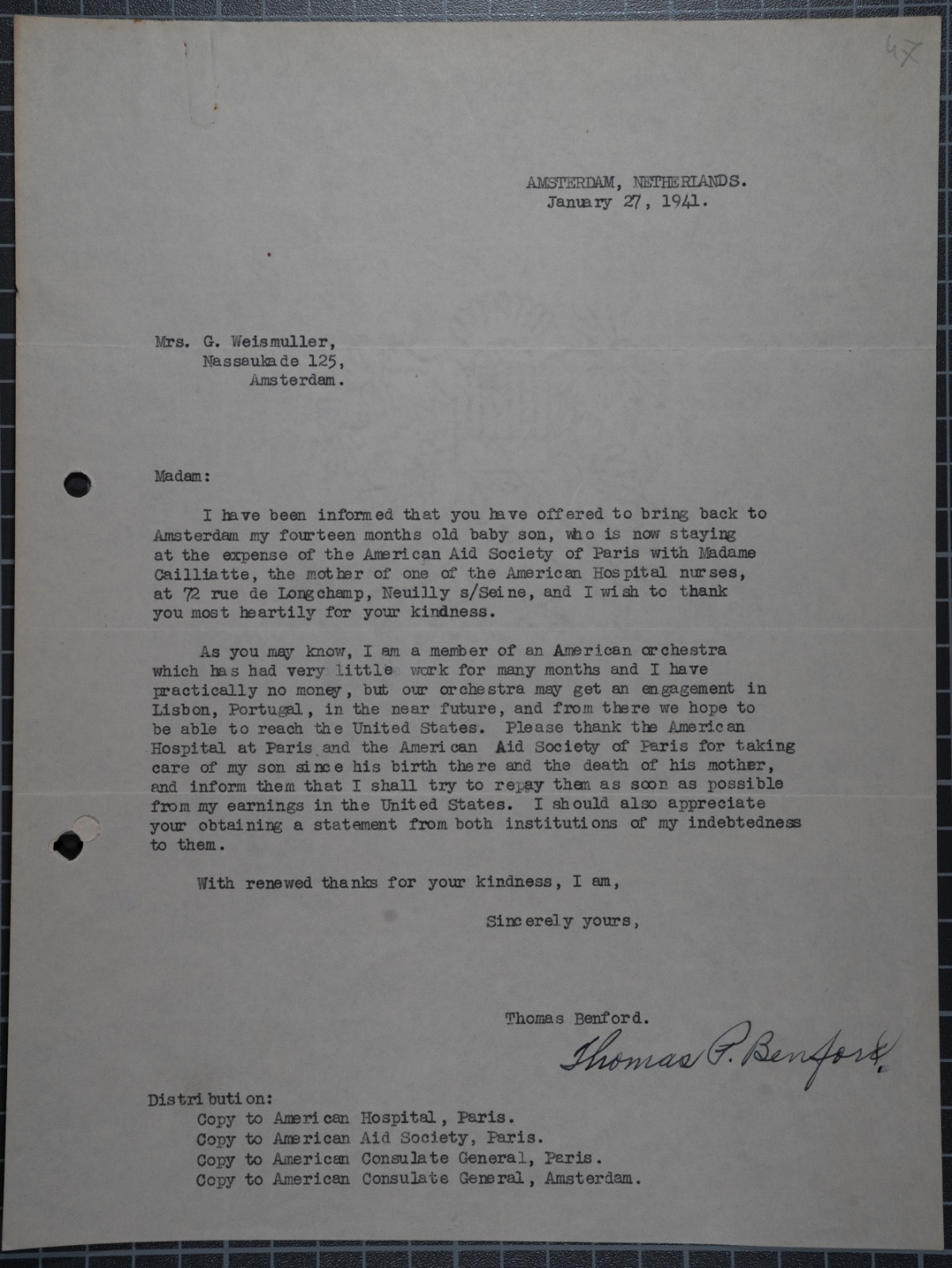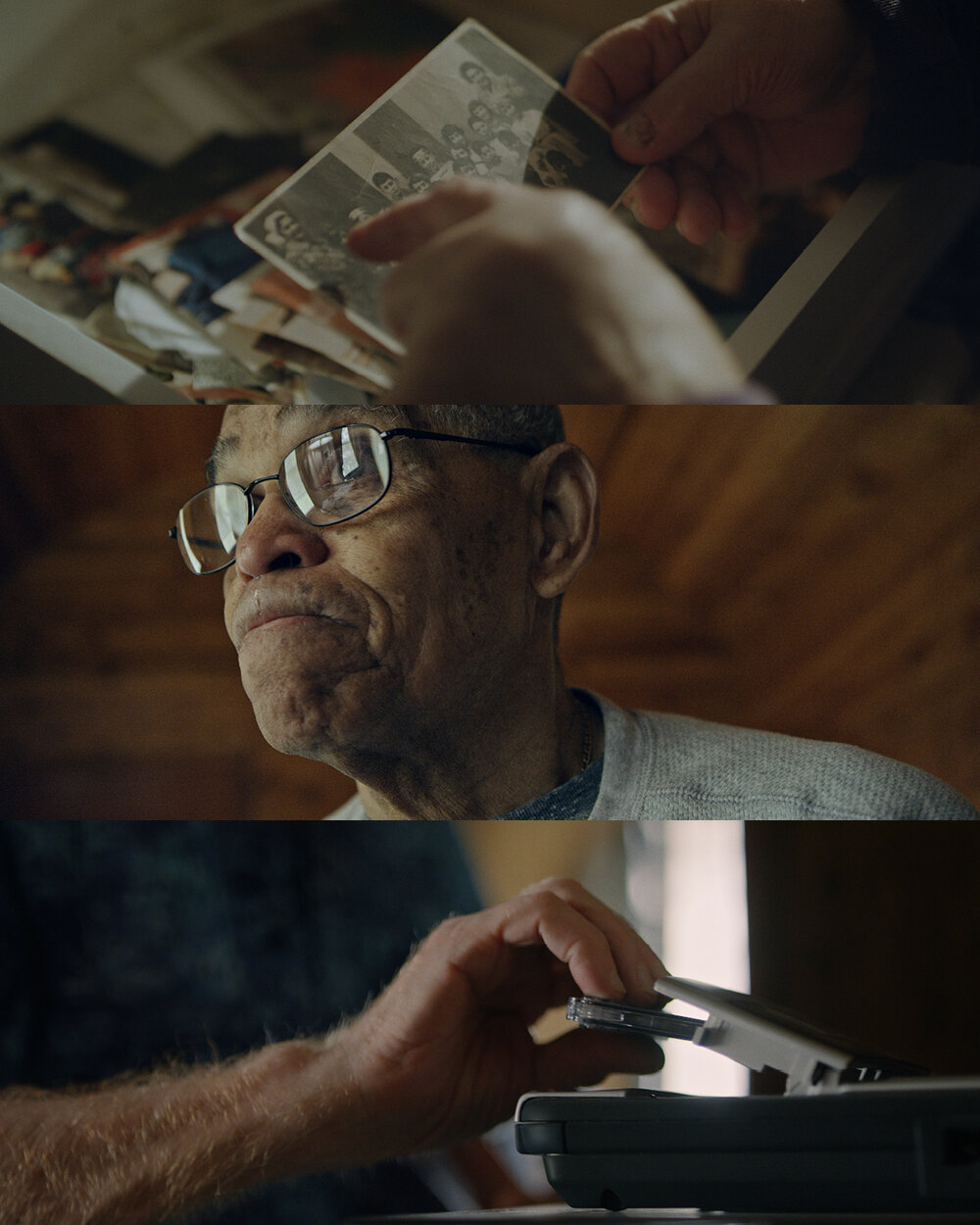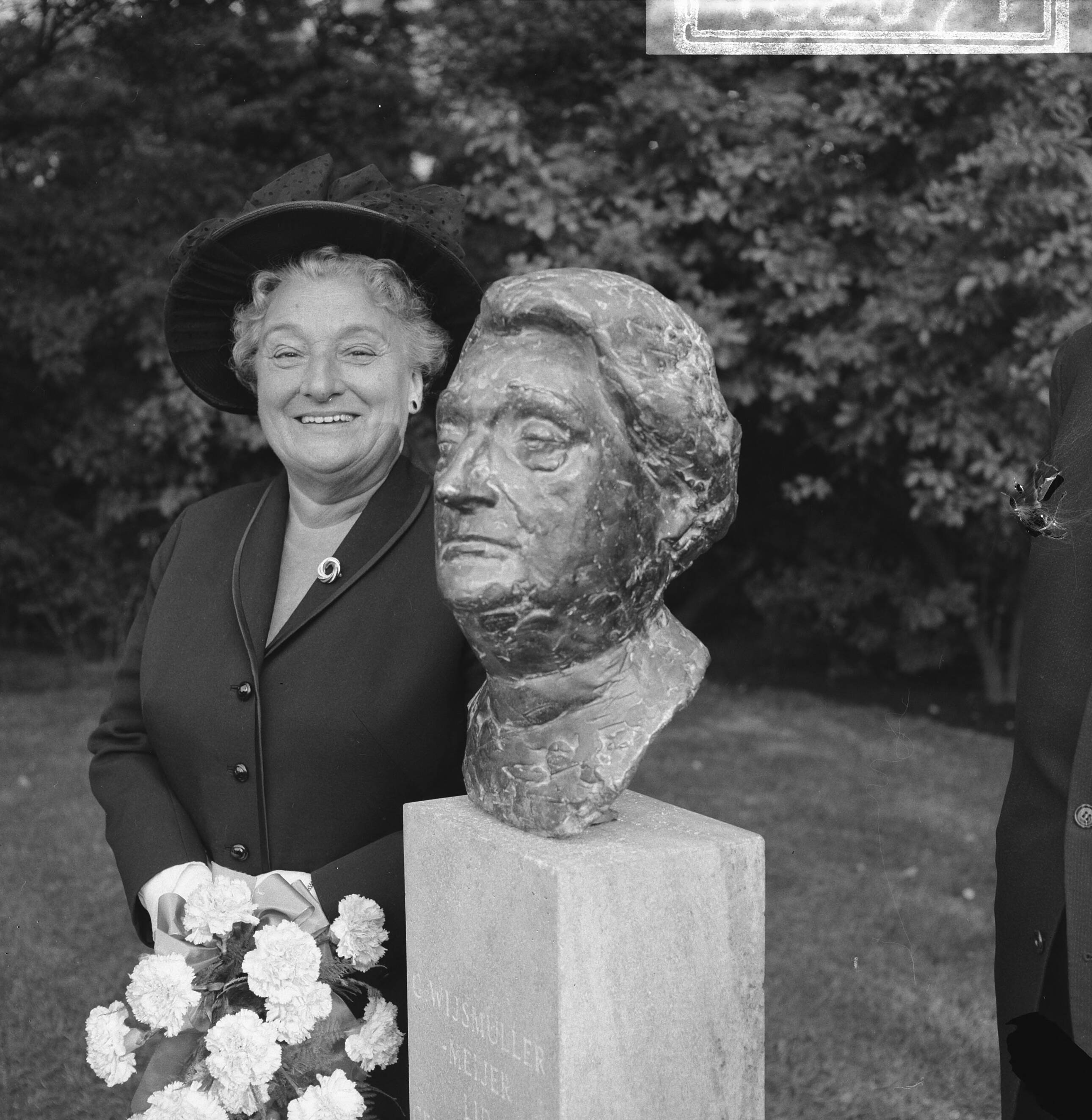Podcast Episode | The Lost Letter

Release date: 14-11-2024 | More about the Podcast Series For the Living and the Dead. Traces of the Holocaust
The Lost Letter
In this episode, a lost letter tells the extraordinary story of Tommy Benford Junior, a baby boy born in Paris in 1939 and saved by the incredible bravery of a Dutch woman called Truus Wijsmuller-Meijer. To look at, the letter is simple, and formally written, but it contains a father’s desperate plea to save his son.
Tommy Benford Junior was born in Paris in 1939. His father was an accomplished American jazz drummer, and his mother, Sophia Mezzaro, was a dancer, singer and pianist from Vienna. Sophia died giving birth to their son in 1939, and Thomas Benford Senior was left unable to care for him and work to provide a living for them both. Poor economic conditions after the outbreak of war and the threat of fascism spreading across Europe meant that Tommy’s father needed to return with his band to the US and couldn’t take his son with him. Unwilling to leave Europe without knowing that his son was in safe hands, Tommy Benford Senior wrote to the American Consulate in Paris, which led to Tommy Junior being collected by Truus, who agreed to take 14-month year old Tommy Junior from Paris to Amsterdam, where she personally cared for him for 9 weeks.
Joining us to tell this story are Jessica van Tijn and Pamela Sturhoofd, directors of the documentary Truus’ Children, and founders of the Truus Wijsmuller Archives. Their documentary not only brings to light the incredible bravery of Truus Wijsmuller-Meijer, who was leading the efforts of the “Kindertransport” that saved the lives of more than 10,000 children during the Second World War, but also captures the moment that Tommy Benford Junior read the letter from his father to Mrs Wijsmuller-Meijer, and learnt the truth about the efforts that went into saving his life. In addition to speaking to Tommy Benford Junior, Sturhoofd and van Tijn were able to speak to 23 people who were saved as children by Truus Wijsmuller-Meijer in the process of making their documentary. Since it’s completion, they’ve met a further three.
Featured guests:
Jessica van Tijn and Pamela Sturhoofd, are directors of the documentary Truus’ Children, and founders of the Truus’ Children Archive. Podcast host is Katharina Freise.
Listen to the episode on Buzzsprout, Spotify, Apple Podcasts, Podcast Addict or here:
Letter from Tommy Benford Senior to Truus Wijsmuller, January 27, 1941.

who found it at the NIOD Amsterdam
This was the letter sent to Truus Wijsmuller-Meijer from Tommy Benford Senior, thanking her wholeheartedly for her kindness, and for stepping in and ensuring the care and safety of his baby son. After Truus collected Tommy Benford Senior from the American Aid Society in Paris, she travelled with him back to The Netherlands. However, upon arrival at the American Embassy in The Hague, she was told that she could not simply leave the child there, and that she must wait for Tommy Benford Senior to make arrangements for the boy. Truus, along with her housekeeper and close confidant, Cietje Hackmann, cared for baby Tommy for 9 weeks at her home in Amsterdam.
As Jessica van Tijn and Pamela Sturhoofd explain in this episode, what is remarkable about this letter is that it reveals two things. One is efforts that Tommy Benford Senior took to ensure the safety of his son, who went on to grow up without any idea of this arrangement. The unexpected discovery of this information and the impact it has on Tommy’s perception of his late father is very emotional, and was captured by van Tijn and Sturhoofd in their documentary Truus’ Children.
The second thing this letter reveals is the incredible lengths that Truus Wijsmuller-Meijer would go to to protect, shelter and save children in need during the Second World War. The effort she was willing to expend on a single child was the effort she put into savings the lives of more than 10,000 persecuted children throughout the war, and the scale to which she succeeded is captured in van Tijn and Sturhoofd’s moving documentary. Truus was a hero, and their documentary is a celebration of and testament to her courage and kindness.
“Truus’ Children” Documentary

courtesy of Jessica van Tijn and
Pamela Sturhoofd.
Jessica van Tijn and Pamela Sturhoofd’s moving documentary, Truus’ Children, which premiered on March 8 2020, is an effort to unearth and bring to light the extraordinary bravery of Dutch resistance fighter, Truus Wijsmuller-Meijer. What started as a straightforward documentary project, though, soon became something else entirely. Sturhoofd and van Tijn, over the course of going through more than 90 hours of film, began to realise that in the process of filming they had begun to amass “material with great historical value” through the letters, documents, images and items they found through their own research and that were shared with them by the children that Truus saved. Having been entrusted with such important material, they felt compelled to establish an online archive in which to keep everything together and ensure its accessibility. In so doing, the idea for the Truus Wijsmuller Archives (TWA) was born, a digital platform that is accessible to anyone interested in the topic: from pupils, students and teachers to scientists and researchers. As Sturhoofd and van Tijn state on the TWA website, the advantage of this digital form is not only that it is accessible from wherever you are, but also that as compilers, they will be able to add any new material that may surface in the future.
The archives are available online, for free and open to anyone interested in learning more about this extraordinary moment in history.
You can watch the trailer for Truus’ Children here.
Truus Wijsmuller-Meijer
Geertrudia (Truus) Wijsmuller-Meijer was a Dutch resistance fighter who dedicated herself before the outbreak of the Second World War to delivering vulnerable children from the persecution of the Nazis. It is believed she is responsible for saving the lives of more than 10,000 children, and it is her remarkable feat of courage and selflessness that is the focus of van Tijn and Sturhoofd’s documentary.

Photograph by Ron Kroon (Anefo).
Courtesy of
The National Archive of The Netherlands.
Truus, as she was known to her family and friends, was born in Alkmaar in 1896 to Jacob Meijer, a drugstore attendant, and Hendrika Boer, a dress-maker. Her parents instilled in her a strong sense of morality and the desire to help people. Truus was working in a bank in 1914 when she met her future husband, J.F. Wijsmuller, and they married in 1922. After they were married, Truus became very actively involved in social work that focused on the enrichment of the lives of women and children in Amsterdam as well as for causes that fought for the progression of women’s rights throughout The Netherlands.
Kindertransport
The “Kindertransport” was a rescue mission of more than 10,000 vulnerable and persecuted children from Nazi-occupied countries including Germany, Czechoslovakia, Austria and Poland. The operation was established in the aftermath of the devastation of “Kristallnacht”, and the first such transport was overseen by Truus Wijsmuller and left Vienna in 1938 bound for Harwich. The rescued children were taken to the United Kingdom over the course of 1938 and 1939 in the lead up to the outbreak of the Second World War.
The Netherlands during WW2
The Netherlands was invaded by Germany on 10 May 1940. The Dutch army surrendered four days later, and Queen Wilhelmina fled to Great Britain, where she set up a government-in-exile. The heads of the government ministries stayed behind, forming a substitute cabinet. Hitler soon ordered the establishment of a German civil administration, led by Reich Commissioner Arthur Seyss-Inquart. The Allies entered the south of the country in the autumn of 1944; the north was liberated more than six months later, in the spring of 1945.
At the start of the occupation, the Netherlands had a total population of about 9 million inhabitants. About 160,000 of them were Jewish, roughly half of which lived in Amsterdam. Some 22,000, including 15,000 refugees from Germany and Austria, were of foreign nationality. In the autumn of 1940, a series of anti-Jewish measures began. In mid-February 1941, the German occupier set up a Jewish Council (Joodse Raad). On 25 February 1941, a general strike broke out to protest against the German occupier. In January 1942 the Germans opened forced labour camps, and charged the Joodse Raad with finding workers to fill ever-increasing labour quotas. The same month they began removing the Jews from the provinces and concentrating them in Amsterdam. In March, the German administration started confiscating Jewish property. A month later the Jews were ordered to wear the yellow Star of David. Deportations began in mid-July 1942 and lasted through September 1944. Jews were taken to the transit camps Westerbork and Vught, and from there mostly to Auschwitz. While some 25,000 Dutch Jews managed to go into hiding after being ordered to report for forced labour or deportation, about one-third of them were eventually discovered by the Germans. All in all, less than 25 percent of Dutch Jewry survived the Holocaust.
Jessica van Tijn and Pamela Sturhoofd
Jessica van Tijn and Pamela Sturhoofd are documentary filmmakers. Together they have undertaken extensive research to trace all of the lives touched by the bravery of Truus Wijsmuller-Meijer,  and to ensure her heroic actions are given the attention she deserves. What started out as a project focusing on the Kindertransport began to slowly snowball into something larger and more touching than expected. The repetition of the same name, that of Truus, across hundreds of archival documents made van Tijn and Sturhoofd realize that the story they had set out to tell had a hero at the heart of it.
and to ensure her heroic actions are given the attention she deserves. What started out as a project focusing on the Kindertransport began to slowly snowball into something larger and more touching than expected. The repetition of the same name, that of Truus, across hundreds of archival documents made van Tijn and Sturhoofd realize that the story they had set out to tell had a hero at the heart of it.
Learn More
- Truus Wijsmuller-Meijer on Wikipedia
- Truus Wijsmuller on Truus’s Children Archive
- Truus’s Children Archive
- The Netherlands on the EHRI Portal
- Trailer for Truus’ Children Documentary
- Kindertransport on the United States Holocaust Memorial Museum Website
Credits
Our thanks go to:
- Jessica van Tijn and Pamela Sturhoofd at the Truus’ Children Archive and for allowing us to use sound from their documentary, Truus’ Children.
- Tommy Benford Junior for use of his story.
-
Our first EHRI intern Anthonia Prins for helping develop this remarkable story into a script
- Music accreditation: Blue Dot Sessions. Tracks – Opening and closing: Stillness. Incidental, Gathering Stasis, Pencil Marks, Uncertain Ground, Marble Transit and Snowmelt. License Creative Commons Atttribution-NonCommercial 4.0 International (BB BY-NC 4.0).
- Andy Clark, Podcastmaker, Studio Lijn 14
